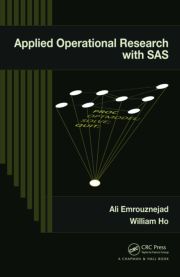Abraham Charnes was born in Hopewell, Virginia, USA on September 4, 1917, son of Harry and Rebecca Charnes. (For details on his biography and scientific work see, Kortanek [1]. See, also Philips [2], and Phillips, Seiford [3].) He died on December 19, 1992 in Austin, Texas at the age of 75. Dr. Charnes graduated in mathematics from the University of Illinois (Urbana-Champaign) in 1938, where he also received a master’s degree in mathematics in 1939. After that he received a graduate scholarship to study at Harvard, but this was interrupted by World War II. In 1942 he entered the U. S. Naval Reserve as an Ensign OV(S) and worked in electromagnetics, torpedo performance and control, supersonic flight, fire control, weapon damage assesment and did the first U. S. pro-submarine operations research. He returned to the University of Illinois where he received a Ph. D. degree in 1947. His dissertation was entitled “Wing-Body Interaction in Linear Supersonic Flow” (adviser D. G. Bourgin). In 1948/49 he began his post-doctoral academic career as an Assistant Professor of Mathematics at Carnegie Institute of Technology. At that time he married Kathryn Francis and began his lifelong collaboration and friendship with W. W. Cooper. Dr. Charnes also taught at Purdue and Northwestern Universities. At Northwestern he was the Walter P. Murphy Professor of Applied Mathematics. Professor Charnes joined The University of Texas at Austin in 1968. There he held the Jesse H. Jones Professorship and was a University System Professor. He was later named the John P. Harbin Professor in the College of Business Administration. He was also the director of the Center for Cybernetic Studies at the University of Texas at Austin.
Professor Charnes was an internationally recognized mathematician, as well as one of pioneers and great contributors in operations research and management science. His fundamental contributions were in mathematics, statistics, engineering optimization, finance, marketing, and human resource management. He was a founder and president (1960) of The Institute of Management Sciences (TIMS) and also the editor of Management Science. He was a fellow of the American Association for the Advancement of Science and the Econometric Society. He published 434 journal articles and eight books. He was a finalist for the Nobel price in 1975. Professor Charnes was the recipient of numerous honors. Among these was the John von Neumann Theory Prize of the TIMS and the Operations Research Society of America (ORSA) in 1982, jointly with W. W. Cooper and R. J. Duffin, for their “fundamental contributions to optimization methods, concepts, and models for problems of decision, planning and design.” He also received the Notable Contributions to the Accounting Literature Award from the American Accounting Association, and the Harold Lardner Memorial Award from the Canadian Operations Research Society. During the celebration of his sixtieth birthday in 1977, Professor Charnes received the U.S. Navy Medal for Public Service, the Navy’s highest civilian award, for his contributions as a research physicist and operations analyst during World War II. In 2006, he was posthumously awarded the Institute for Operations Research and the Management Sciences’ IMPACT Prize jointly with W. W. Cooper for all their work on DEA. Professor Charnes is one of only twenty-three individuals to be elected into the International Federation of Operational Research Societies’ Hall of Fame as of spring, 2015.
Charnes, Cooper and Rhodes introduced the basic CCR model of Data Envelopment Analysis (DEA) in their seminal paper „Measurnig the Efficiency of Decision Making Units“, which was published in the European Journal of Operational Research (EJOR) in 1978. Professor Charnes contributed in DEA as an author or co-author with many published papers in the theory and applications. Stability of the CCR model of DEA, proved by Charnes, Cooper, Sears and Zlobec, was very important for applications. He also was an adviser to many students who received Ph. D. degrees in a variety of areas including DEA.
Professor Charnes was remarkable in many ways: a distinguished scientist, and professor, an adviser, a husband, and father, and a friend, who was ready to help anyone. I was fortunate and honored to do my post-doctoral research, as a Visiting Fulbright Scholar in 1985/86, under his supervision in the Center for Cybernetic Studies at the University of Texas. The results of our joint work on sensitivity analysis in DEA were published in six papers in Glasnik Matematicki and EJOR.
Given the seminal contributions of Professor Charnes to DEA as well as many other fields, We will orginse a session devoted to Professor Abraham Charnes on the occasion of hundred years since his birthday in the DEA2017 in Prague, Czech Republic, June 26 – 29.
If you are intersted to contribute to this session please send your proposal to lneralic@efzg.hr
Zagreb, Croatia
July, 2016
Professor Emeritus Luka Neralic (lneralic@efzg.hr)
University of Zagreb, Croatia
References
[1] K. O. Kortanek (1980), „A Biography of Professor A. Charnes and His Scientific Work“, In: A. V. Fiacco and K. O. Kortanek (Eds.), Extremal Methods and Systems Analysis An International Symposium on the Occasion of Professor Abraham Charnes’ Sixtieth Birthday Austin, Texas, September 13 – 15, 1977, pp. 2 – 9.
[2] F. Philips (1997), „In Memoriam Abraham Charnes, 1917 – 1992“, In: A. Y. Lewin and L. M. Seiford (Eds.), From Efficiency Calculations to a New Approach for Organizing and Analyzing: DEA Fifteen Years Later, Annals of Operations Research, 73, 389 – 391.
[3] F. Y. Phillips and L. M. Seiford (2011), „Abraham Charnes“, In: A. A. Assad, S. I. Gass (Eds.), Profiles in Operations Research Pioneers and Innovators, Chapter 18, pp. 325 – 342, Springer Science+Business Media, LLC, New York.














